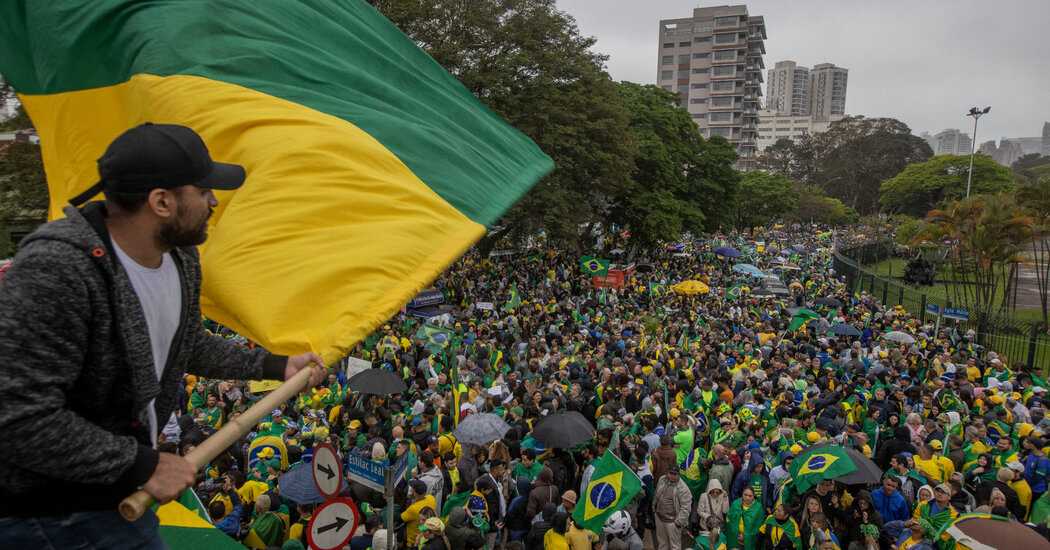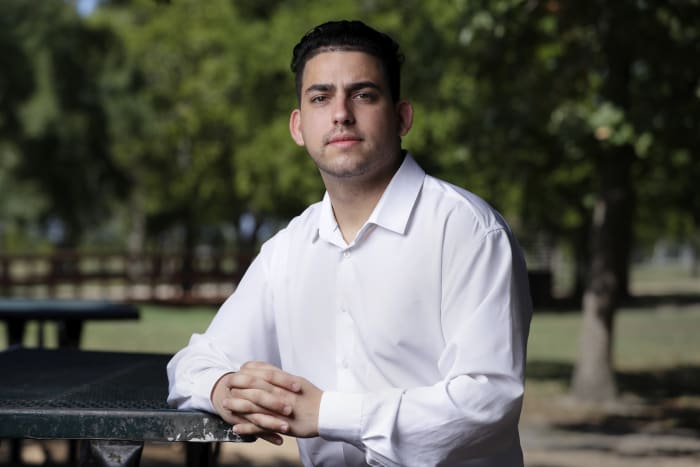
www.nytimes.com
Brazil Counted All Its Votes in Hours. It Still Faces Fraud Claims.
A report from the military found no voter fraud — but left room for Bolsonaro’s supporters to argue maybe he’d actually won.
International
RIO DE JANEIRO — Nearly two weeks after Brazil’s presidential election, government officials and independent security experts have reviewed the results and made a clear determination: There is no credible evidence of voter fraud.
Yet Brazil still finds itself grappling with a wave of rigged-election claims from many supporters of the far-right president, Jair Bolsonaro.
On Wednesday, those baseless claims received new fuel from a highly anticipated report on the voting process from Brazil’s military, which the head of Mr. Bolsonaro’s party said would determine whether the party officially accepted the election’s results.
In the report, the military said it found no evidence of any irregularities. It also said that the nature of Brazil’s fully digital voting system meant it could not decisively rule out a specific fraud scenario.
Independent security experts generally applauded the report, saying it was technically sound. They had pointed out the same hypothetical fraud scenario in the past — government insiders inserting sophisticated malicious software onto Brazil’s voting machines — while also stressing that it was extremely unlikely.
However, to many of Mr. Bolsonaro’s supporters, including some prominent conservative pundits, the report was further evidence the president’s loss should be questioned.
“Something needs to be done,” Filipe Barros, a conservative Brazilian lawmaker, said in a speech on the House floor late Wednesday. He compared election officials to thieves who can stop the police from investigating.
Brazil finds itself in a tricky situation. Security experts say its electronic voting system is reliable, efficient and, like any digital system, not 100 percent secure. Now politically motivated actors are using that kernel of truth as reason to question the results of a vote in which there is no evidence of fraud.
The case illustrates the new challenge of running elections in the modern age, when the democratic process is under attack in countries across the world. Voting systems can be highly reliable, but they are almost never perfect. So when people are looking for reasons to doubt the integrity of an election — fueled by online conspiracy theories and egged on by leaders like Mr. Bolsonaro and former President Donald J. Trump — any sign of imperfection can be quickly framed as a fatal flaw.
“That’s the problem with technical reports: They just speak facts, and people take those and do whatever they want with it,” said Marcos Simplício, a cybersecurity researcher at the University of São Paulo who tests Brazil’s voting machines. “They can just say, ‘See, there are points of improvement. So it’s not secure. We cannot use it.’”
For years, Mr. Bolsonaro has attacked Brazil’s election system as rife with fraud, despite a lack of evidence. As a result, three out of four of Mr. Bolsonaro’s supporters now say they trust Brazil’s voting machines only a little or not at all, according to polls.
To ease those concerns, election officials invited Brazil’s military to a transparency committee last year. It was seen as a gesture to Mr. Bolsonaro, a former Army captain who had stacked his administration with generals. Quickly the military began echoing some of Mr. Bolsonaro’s criticism, raising worries in a nation that had suffered under a military dictatorship until 1985.
Eventually, the military and election officials agreed to some changes to voting-machine tests. On Wednesday, the military’s involvement was set to conclude with its report.
Mr. Bolsonaro’s supporters have been eagerly awaiting the report. Thousands of them, angry over the election results, have amassed outside military bases and blocked highways in an effort to get the armed forced to intervene in the government.
They have also pushed videos of malfunctioning voting machines, unattributed reports of foul play from election officials and inaccurate analyses of voting returns as proof of something amiss. Mr. Simplício and other independent experts have examined the claims and said they have no validity.
“It’s all completely bogus,” Mr. Simplício said.
Election officials in Brazil have responded aggressively to such claims, looking to restrict the flow of misinformation online. They have ordered tech companies to suspend the accounts of more than a dozen prominent conservative voices, including five members of Congress, for posting misleading information about the integrity of the election.
The man at the forefront of that effort is Alexandre de Moraes, a Supreme Court justice who is also Brazil’s elections chief. He has called election-fraud claims a criminal threat to Brazil’s democracy.
He has also operated with little transparency. His orders are typically sealed, and tech companies, fearful of his power, are reluctant to discuss them. He has declined repeated requests for interviews.
The New York Times viewed one of his sealed court orders: a directive to take down the social media accounts of a congresswoman who had encouraged protesters trying to overturn the election. In that order, he acted unilaterally, using new powers that election officials granted him last month. That new authority has made Mr. Moraes among the most powerful arbiters in any democratic government over what can be said online. It has also further divided Brazil over how he is wielding his power.
The left views him as a hero protecting the country’s democracy, while the right says he is an autocrat censoring dissenting voices. His actions have most likely slowed the spread of spurious fraud claims, but they have also fueled further suspicions of a government cover-up.
Mr. Moraes said in a statement Wednesday night that election officials would analyze the military’s suggestions to improve the system and that the Brazil’s “voting machines are a source of national pride.”
Three hours after the polls closed last week, computers had counted virtually all 118 million votes. That efficiency is in part because Brazil is the only country in the world to use a fully digital voting system, without paper backups. Yet for years Mr. Bolsonaro has framed that lack of paper backups as a vulnerability that throws any election into question.
The military said that its technical experts found no inconsistencies in the voting process or in the results of the two national votes last month. It also said that election officials had not allowed its experts to fully inspect the voting machines’ 17 million lines of computer code and that officials did not test enough machines on Election Day to rule out the possibility that they contained malicious software that could manipulate vote counts.
“It’s very technically correct,” said Mr. Simplício, the cybersecurity researcher. “I don’t have any anything other than applause for them.”
Still, Mr. Simplício and other experts have said that the machines are highly safe, with layers of security designed to prevent fraud and errors. Mr. Simplício’s team of cybersecurity researchers, for instance, have tried to hack the machines to no avail. That is in part because the machines are not connected to the internet, making them virtually impossible to manipulate without physical access, and because they are encrypted and use technology to protect their encryption keys similar to that used in iPhones.
Yet, experts have pointed out one scenario that appears possible. A group of government engineers who write the machines’ software could insert malicious code to change votes. But to do so, multiple engineers would need to act at the exact right time and work together without detection. And the malicious code would have to be sophisticated enough to recognize a test of the machines and deactivate itself for the duration of the test.
“I’m talking about computer security theory,” said Diego Aranha, a cybersecurity researcher who has studied Brazil’s voting machines for years. “I’m not saying any of this happened.”
Mr. Bolsonaro has not claimed fraud in the election, but has also not explicitly acknowledged his defeat. But he has authorized his government to begin the transition to President-elect Luiz Inácio Lula da Silva.
On Tuesday, the head of Mr. Bolsonaro’s political party said the party would wait for the military’s report before deciding whether to officially accept the election results. On Thursday morning, after the report, a party spokesman declined to comment.
Security experts generally back the concept of paper backups, which has been pushed by Mr. Bolsonaro. But they also warn it would introduce another variable that could be attacked by bad actors — or, perhaps more important, exploited by those claiming voter fraud.
“It’s not clear that it would solve the problem, either. People would still have crazy theories,” Mr. Aranha said.
“How can you really produce something that people will find convincing and will accept?” he added. “The deeper crisis is, of course, the crisis of democracy itself.”
André Spigariol contributed reporting from Brasília.
























































